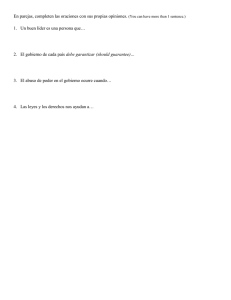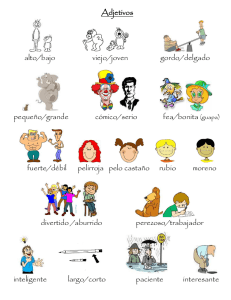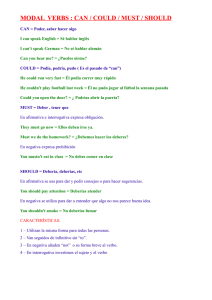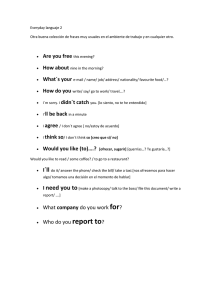You should go to the doctor / Deberías ir al médico
Anuncio
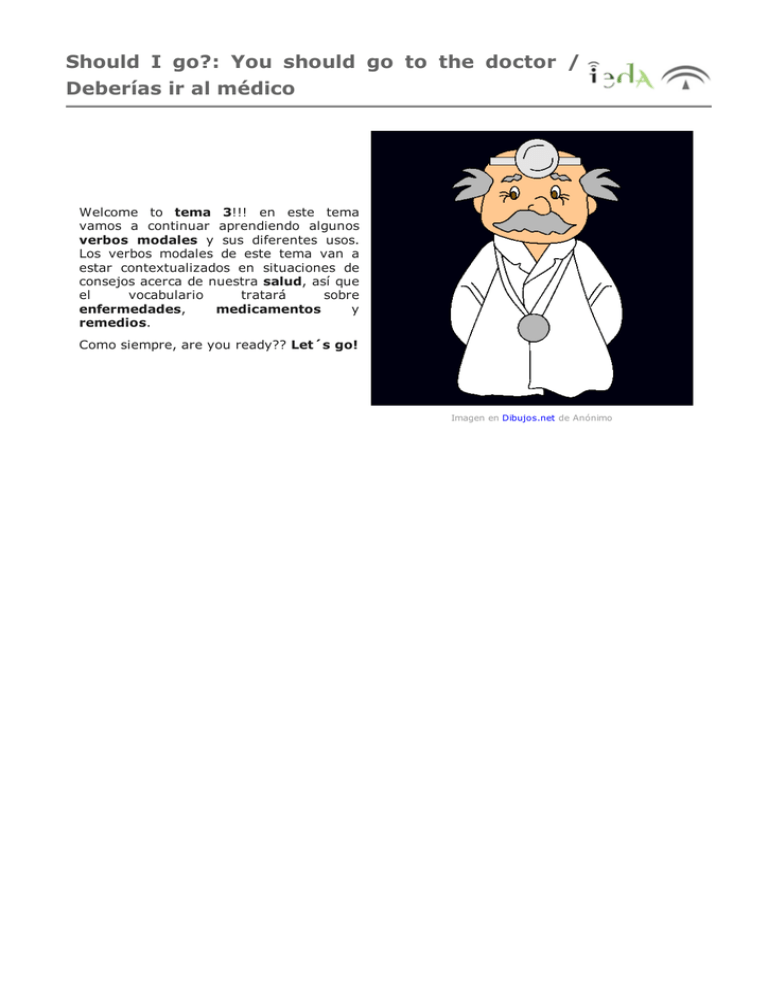
Should I go?: You should go to the doctor / Deberías ir al médico Welcome to tema 3!!! en este tema vamos a continuar aprendiendo algunos verbos modales y sus diferentes usos. Los verbos modales de este tema van a estar contextualizados en situaciones de consejos acerca de nuestra salud, así que el vocabulario tratará sobre enfermedades, medicamentos y remedios. Como siempre, are you ready?? Let´s go! Imagen en Dibujos.net de Anónimo 1. You shouldn´t give her a lot to eat / No deberías darle mucho de comer Un día al llegar a casa después de clase se encuentra con que su compañera de piso Anne tiene una fiebre altísima. La verdad es que María no sabe muy bien que debería hacer y decide consultar en internet qué se debería hacer cuando alguien tiene fiebre alta. Estos consejos son los que le aparecieron: Things you should do when a person has got a temperature1 : You should give him/her a paracetamol tablet2 . (First, you should make sure that he/she is not allergic to paracetamol) You should make sure the person doesn´t have too many blankets3 on the bed. (Too much heat on the bed could make the temperature rise4 ) You should give him/her a lot of water to drink. (When you have a temperature you sweat5 and you have to drink the liquid you lose) You may prepare a cool bath for him/her if the temperature doesn´t go down6 . (This may help in extreme cases, but it is not something you should do immediately) You may also put a cool towel on his/her forehead7. You shouldn´t give him/her a lot to eat. (Too much food is difficult for the body to digest when you have a temperature) OR you could simply take him/her to the doctor. (If possible, this is always the best option) Vocabulary: (1) Temperature: Fiebre (2) Tablet: Pastilla (3) Blankets: Mantas (4) Rise: Aumentar (5) Sweat: Sudar (6) Go down: Bajar (7) Forehead: Frente Imagen de wikimedia, bajo licencia de Creative Commons Vamos a ver si has entendido los consejos. Contesta TRUE or FALSE. 1.- If you have got a temperature you should take an aspirin Verdadero Falso 2.- If you have too many blankets the temperature may rise Verdadero Falso 3.- It is better not to drink anything while you have got a temperature Verdadero Falso 4.- Asking the doctor what to do is a very good idea Verdadero Falso Actividad Como ves, los consejos eran muy fáciles de entender. Seguro que te has fijado en una palabra que se repite mucho en el texto y sale por primera vez: SHOULD ¿Te acuerdas de los verbos modales? Pues SHOULD es un verbo modal. Esto significa que: No lo podemos conjugar en otros tiempos, sólo en presente. Siempre va seguido de otro verbo (en infinitivo) No tiene -s en la tercera persona (he, she, it) No utiliza do/does para negar o preguntar. (I should, I shouldn´t, should I?) You SHOULD significa “DEBERÍAS”. Por eso se utiliza principalmente para dar consejos en inglés. Si te apetece practicar un poco este verbo modal, pincha aquí (para el primer ejercicio recuerda que mustn´t se usa para prohibición) SHOULD siginfíca DEBERÍA. SHOULD es un verbo MODAL. (I should, I shouldn´t, should I?) Utilizamos SHOULD para dar consejos. ¿Sabías que en Inglaterra no existen las farmacias como las conocemos aquí en España? Allí forman parte de la sección de droguería de grandes superficies o cadenas especializadas en la venta de cosméticos y similares. Actividad de Lectura 1. Escribe 4 consejos para alguien que tiene un resfriado: a) You should b) You should c) You shouldn´t d) You shouldn´t AV - Actividad de Espacios en Blanco 2. Une los consejos con las situaciones: a)You shouldn´t drive b)You should study 1. You have got an exam tomorrow 2. It is -11Cº outside and you are going out. c)You should wear a tie d)You should wear a coat 3. It is you sister´s wedding. 4. You have drunk a lot of alcohol. Enviar Actividad de Lectura 3. Escribe un consejo para estas situaciones: c) Peter has a new car. HE......... d) You are tired. YOU..... 2. You could take her to the doctor / Podrías llevarla al médico Si te fijaste bien en los consejos de internet que buscó María descubrirías que SHOULD no es el único verbo modal nuevo que vamos a aprender. Hay otros dos, ¿serías capaz de encontrarlos? Inténtalo. Things you should do when a person has got a temperature: You should give him/her a paracetamol tablet. (First, you should make sure that he/she is not allergic to paracetamol) You should make sure the person doesn´t have too many blankets on the bed. (Too much heat on the bed could make the temperature rise) You should give him/her a lot of water to drink. (When you have a temperature you sweat and you have to drink the liquid you lose) You may prepare a cool bath for him/her if the temperature doesn´t go down. (This may help in extreme cases, but it is not something you should do immediately) You may also put a cool towel on his/her forehead. You shouldn´t give him/her a lot to eat. (Too much food is difficult for the body to digest when you have a temperature) Imagen de Jocelyn Augustino en Wikimedia bajo licencia CC OR you could simply take him/her to the doctor. (If possible, this is always the best option). ¡Muy bien! En efecto los otros dos verbos modales son: MAY y COULD. MAY y COULD son verbos modales y esto significa que: No los podemos conjugar en otros tiempos. Siempre van seguidos de otro verbo (en infinitivo) No tienen -s en la tercera persona (he, she, it) No utilizan DO/DOES para negar o preguntar. (I may, I may not, may I?/ I could, I couldn´t, Could I?) COULD significa “PODRÍAS”. También es el pasado de CAN. Se usa para: a) expresar HABILIDAD EN PASADO (como pasado de CAN): She could speak English when she was five. (Sabía hablar inglés cuando tenía 5 años) b) PEDIR PERMISO: Could you pass me the salt, please? (¿Podrías pasarme la sal, por favor?) c) expresar la POSIBILIDAD/PROBABILIDAD de que algo ocurra: It could rain tomorrow.(Podría llover mañana) MAY significa “PODER” pero en el sentido de: a) PEDIR PERMISO: May I open the window? (¿Puedo abrir la ventana?) b) expresar PROBABILIDAD/POSIBILIDAD: You may prepare a cool bath ---- Tienes la posibilidad/opción de preparar un baño frío. It may rain --- Puede que llueva (existe la posibilidad de que llueva) Aquí tienes unos ejercicios para practicar: Exercise 1 Exercise 2 Actividad COULD siginfíca PODRÍA. MAY significa PUEDO (permiso: May I open the door? o posibilidad: It may rain) Could y May, cuando expresan: probabilidad/posibilidad considerar sinónimos. se se prefiere Could en lugar normalmente para pedir permiso. pueden de May youtube Actividad de Lectura 1. Traduce las siguientes frases utilizando COULD. a) Tú podrías ayudar. b) Ellos podrían venir. c) Nosotros podríamos cocinar los sábados. d) Él podría ser más amable. Actividad de Lectura 2. Escribe las frases del ejercicio anterior en negativo. Utiliza COULDN´T. a) Tú no podrías ayudar. b) Ellos no podrían venir. c) Nosotros no podríamos cocinar los sábados. d) Él no podría ser más amable. AV - Actividad de Espacios en Blanco 3. a) It b) He Rellena los huecos con MAY. rain today. come to the party. c) I open the door? d) I go to the garden? Enviar Actividad de Lectura 4. ¿Qué frases del ejercicio anterior expresan posibilidad y cuáles permiso? 5. Traduce las frases del ejercicio 3 al español. 3. Vocabulary: Health Como has podido observar a lo largo del tema, estamos viendo los verbos modales en el contexto de la salud y enfermedades, así que , en este apartado vamos a aprender palabras que tienen que ver con este nuevo vocabulario. Inur magazine Sunscreen: protección solar Antes de comenzar con las palabras específicas debemos aprender a decir cómo nos sentimos, por ejemplo, si alguien te pregunta: ¿Cómo te encuentras? (how do you feel?) Tu respuesta debe ser: I feel fine/ good or I´m fine (me encuentro bien), , I have a temperature/ fever (tengo fiebre), I have a headache (me duele la cabeza): Hospital Doctor: médico Nurse: enfermera /o Chemist: Farmaceútica Chemist´s, pharmacy Farmacia Imagen de wikimedia bajo licencia de Creative Imagen de wikimedia bajo licencia de Creative Imagen de wikimedia bajo licencia de Creative Commons Commons Commons Band aid: Tirita Sticking plaster: Esparadrapo Plaster: Escayola Broken leg: pierna rota Saprain his (her, my) ankle esguince Broken arm: Brazo roto, etc Imagen de wikimedia bajo licencia de Creative Imagen de wikimedia bajo licencia de Creative Imagen de wikimedia bajo licencia de Creative Commons Commons Commons Headache: Dolor de cabeza Sore throat: Dolor de garganta Earache: Dolor de oidos She has a cold: Está resfriadad Elaboración propia Elaboración propia Toothache: Dolor de muelas Elaboración propia Video con el vocabulario youtube Aquí tienes muchos ejercicios para practicar, hazlos ya que siempre es muy útil conocer este vocabulario. Es muy fácil encontrarte en una de estas situaciones: Exercise 1 Exercise 2 Exercise 3 Exercise 4 4. Culture: Health Health and Fitness Proverbs and Sayings 1.- “An apple a day keeps the doctor away” 2.- “A good rest is half the work” 3.- “A stitch in time saves nine” 4.- “A healthy man is a successful man” 5.- “Eat to live, not live to eat” 6.- “Early to bed and early to rise, makes a man healthy, wealthy and wise” 7.- “He, who has health, has hope; and he who has hope has everything” Elaboración propia 8.- “Hygiene is two thirds of health” 9.- “Prevention is better than cure” 10-“You are what you eat” AV - Actividad de Espacios en Blanco ¿Qué proverbio inglés siginfica:...? a) Come para vivir, no vivas para comer. b) Somos lo que comemos c) Si comes una manzana al día, no enfermarás. d) Un punto a tiempo ahorra nueve. e) Un hombre sano es un hombre con éxito. f) El que se acuesta y se levanta pronto está sano, con bienes y es sabio. g) La higiene es dos tercios de la salud. j) Más vale prevenir que curar. Enviar
